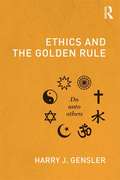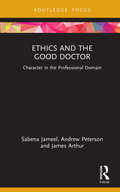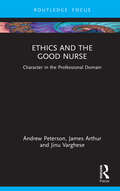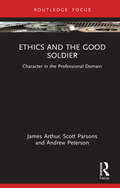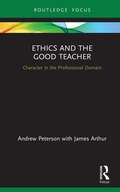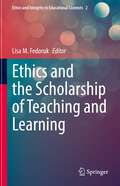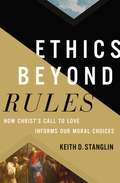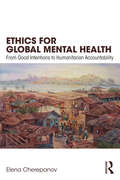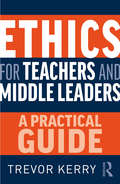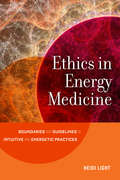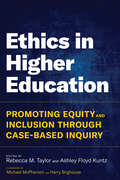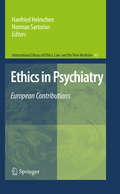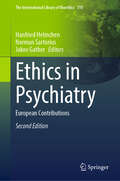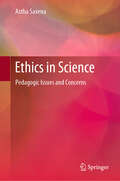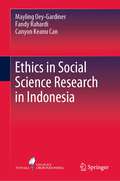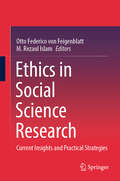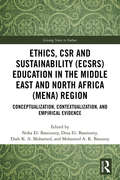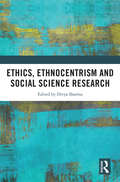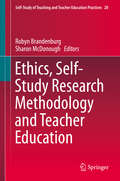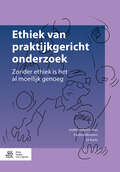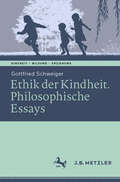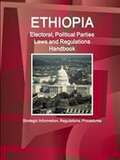- Table View
- List View
Ethics and the Golden Rule
by Harry J GenslerIt is commonly accepted that the golden rule—most often formulated as "do unto others as you would have them do unto you"—is a unifying element between many diverse religious traditions, both Eastern and Western. Its influence also extends beyond such traditions, since many non-religious individuals hold up the golden rule as central to their lives. Yet, while it is extraordinarily important and widespread, the golden rule is often dismissed by scholars as a vague proverb that quickly leads to absurdities when one attempts to formulate it in clear terms. In this book, Harry J. Gensler defends the golden rule and addresses all of the major philosophic objections, pointing out several common misunderstanding and misapplications. Gensler first discusses golden-rule reasoning and how to avoid the main pitfalls. He then relates the golden rule to world religions and history, and to areas like moral education, egoism, evolution, society, racism, business, and medicine. The book ends with a discussion of theoretical issues (like whether all morality reduces to the golden rule, which the author argues against). Ethics and the Golden Rule offers two introductory chapters, the first is simpler and the second more technical; a reader may start with either or both. One can then read any combination of further chapters, in any order, depending on one’s interests; but Chapters 13 and 14 are technical and assume one has read Chapter 2. This is "a golden-rule book for everyone," accessible to a wide readership.
Ethics and the Good Doctor: Character in the Professional Domain (Character and Virtue Within the Professions)
by Andrew Peterson James Arthur Sabena JameelEthics and the Good Doctor brings together existing literature and an analysis of empirical research conducted by the Jubilee Centre for Character and Virtues to examine the ethical nature of medical practice and explore medicine as a virtuous profession. The book is based on the idea that medical practice is an inherently moral profession, in which notions of trust, care and meaningful relationships form the foundations of being a good doctor. By taking into account the ethical dimensions of medical practice that have come under greater scrutiny and pressure over recent years, this book explores how personal and professional character is understood, enacted, and experienced by medical practitioners at various stages of their career. Ethics and the Good Doctor situates and presents the empirical data in a way that is accessible to practicing doctors, medical students, and medical educators. Clear implications for policy, practice, and research are offered, ensuring this book will be of great interest to a range of stakeholders involved in medical practice, including those working in medical policy.
Ethics and the Good Nurse: Character in the Professional Domain (Character and Virtue Within the Professions)
by Andrew Peterson James Arthur Jinu VargheseEthics and the Good Nurse draws on internationally leading empirical research conducted by the Jubilee Centre for Character and Virtues and explores nursing as a virtuous profession through a close examination of nurses’ character. With the belief that virtues such as kindness, integrity, compassion and honesty are core to the nursing profession, this book draws on extended insights from the Jubilee Centre’s Virtuous Practicing in Nursing study to understand the role of such virtues in the professional practice and education of nurses. The book brings together knowledge from academics, scholars and practitioners to address the influence of personal and professional character on nurses and nursing. By including clear implications for policy, practice and research, Ethics and the Good Nurse serves as essential reading for a wide audience, including nurses, policy makers and nursing organisations and provides a timely and much-needed contribution to the field of nursing and character education.
Ethics and the Good Soldier: Character in the Professional Domain (Character and Virtue Within the Professions)
by Andrew Peterson James Arthur Scott ParsonsBuilding on extensive, internationally leading empirical research conducted by the Jubilee Centre for Character and Virtues, this book explores the soldier as a virtuous professional through a close examination of soldiers’ character and ethical reasoning. Starting from the view that virtues such as courage, honesty, loyalty and integrity are core to being a professional soldier, the book draws on insights from British soldiers at three stages of their career – officer cadets (at Sandhurst), junior lieutenants/captains (attending the Junior Officer Tactical Awareness Course), and senior captains (participating in the Captain’s Warfare Course). Drawing upon the Jubilee Centre’s Soldiers of Character study, the book explores soldiers’ character in the professional domain. Including clear implications for practice and research, this is essential reading for all those interested in the character of soldiers in both a professional and academic setting.
Ethics and the Good Teacher: Character in the Professional Domain (Character and Virtue Within the Professions)
by Andrew Peterson James ArthurEthics and the Good Teacher brings together reviews of existing literature and analysis of empirical data from three research projects conducted by the Jubilee Centre for Character and Virtues – The Good Teacher, Schools of Virtue and Teacher Education – to explore the ethical dimensions of the teaching profession. The book is premised on the idea that what constitutes a "good" teacher involves more than technical skills and subject knowledge. Understood as a professional activity, teaching involves an important ethical dimension, a fact that has come under increased scrutiny – and some would argue increased threat – over recent years as education and schooling have become shaped by market logic and accountability. Addressing the influence of personal and professional character on teachers and teaching, and containing clear implications for policy, practice and research, this book will be of great interest to teachers and other professionals working in education settings, as well as those working in educational policy. It will also appeal to academics, undergraduate students and postgraduate students researching the teaching profession and ethics/morality in education more generally.
Ethics and the Scholarship of Teaching and Learning (Ethics and Integrity in Educational Contexts #2)
by Lisa M. FedorukThis book addresses issues related to ethics and the scholarship of teaching and learning, and pays special attention to ethical concerns and experiences that have arisen from engaging in Scholarship of Teaching and Learning (SoTL) work. The book draws on a range of research projects, theoretical frameworks and narrative experiences to provide multiple perspectives of how meaning is made of research ethics in SoTL, academic community and REB partnerships, experiences of Students as Partners in SoTL, and ethically-minded approaches to teaching, learning and inquiry. Specifically, this edited book includes ethical practices that have become increasingly expansive in an ever-evolving academic environment such as navigating pandemic pedagogy and data ownership due to increased online content. In addition, contributions pertaining to academic community partnerships between REBs and faculty detail realistic narratives and lessons learned about how higher education can become more equitable, diverse and inclusive. Subsequently, decolonial ethics for teaching and learning in higher education, as well as participatory parity, exemplify the need for SoTL practitioners to be responsive to the social and cultural realities of a global context in ways that address social inequities and social responsibility. Relational ethics by way of student perspectives on vulnerability and classroom-based SoTL research underscore the need for students to be taught about their own agency as a means of providing student voice within SoTL work. Lastly, this book celebrates how ethically-minded approaches to teaching, learning and inquiry uncover strategies and pedagogy that encourage concepts such as ethical imagination and systems and design thinking practices.
Ethics beyond Rules: How Christ’s Call to Love Informs Our Moral Choices
by Keith D StanglinAn introduction to ethics that will help Christians rediscover a moral reasoning rooted in Scripture and navigate the ethical crises of our time. How should Christians live? How should we interact with one another? Why do we think the way we do about right and wrong? How should we approach today's complex moral questions? Keith Stanglin realigns our ethical thinking around the central question: What does real love require? applying it to our ethical reasoning on many of the social issues present in today's culture:abortionsexual ethicsconsumerismtechnologyraceand politicsMoral evaluation must be based on more than our subjective feelings or the received wisdom or majority opinion of our community. But thinking objectively and reasonably about our ethical commitments is a process that's rarely taught in contemporary education or even in churches.Ethics Beyond Rules is a clear and accessible introduction for thoughtful Christians who want to lead moral lives—who want to define their moral code by firm biblical standards while acknowledging the complex nature of the issues at hand. Stanglin's love-based framework for moral decision-making engages Scripture and the historic Christian faith, giving Christians the tools to clear-mindedly consider the ethical problems of today and the foundation to confront new issues in the years to come.
Ethics for Global Mental Health: From Good Intentions to Humanitarian Accountability
by Elena CherepanovEthics for Global Mental Health examines the limitations of current normative approaches to global mental health (GMH) work and argues for a values-based framework that prioritizes accountability and contextual relevance of humanitarian and profession-specific values. It cautions against using aspirational ideals as operational guidance. Chapters are organized around challenges arising in humanitarian research, disaster relief, post-conflict recovery, fieldwork, and refugee resettlement and are designed to equip readers with strategies for resolving professional dilemmas and negotiating conflicting priorities. Also included is a sample training curriculum as well as case studies and exercises that help professionals address countertransference and burnout, and recognize ethically questionable practices such as trauma tourism, rescuer fantasy, or savior complex.
Ethics for Teachers and Middle Leaders: A Practical Guide
by Trevor KerryEvery school has a mission statement based on values and ethical beliefs. Ethics for Teachers and Middle Leaders sets out a way of thinking through the key issues of ethics in teaching and shows how a school’s ethical values can be translated by students and staff into action. It is designed to help rehearse certain ethical dilemmas and guide teacher leaders in helping others to think through and develop appropriate behaviours. Chapters consider the role of ethics in all aspects of school life including teacher professionalism, teaching methods, lesson planning and assessment. This book not only examines everyday concerns such as class management and presenting curriculum ethically, but also touches upon emerging issues in e-learning, career building, leadership and school governance. Packed full of real examples from schools and opportunities to reflect, the book will help readers to understand how their behaviour, decisions and advice to others might be guided and to avoid some of the common pitfalls in school. This insightful book will instil confidence in teachers and middle leaders as they face such ethical dilemmas in their daily work.
Ethics in Energy Medicine: Boundaries and Guidelines for Intuitive and Energetic Practices
by Heidi LightThe first guidebook to discuss the full scope of the intuitive process and propose structures to keep practitioners and clients safeHeidi Light, a family counselor and certified hypnotherapist, asserts that we are in desperate need of guidance and standards so that we can approach the world of intuition, energy, and mysticism from a healthy and respectful place. Drawing from her more than forty years as a medical intuitive, empath, and energy tracker—as well as twenty years as a counselor in private, clinical, and institutional settings—Light offers practical, simple solutions to the alarming lack of boundaries in the fields of intuition and energy medicine. From massage therapists who just throw in a little extra energy work, to psychics who read your sister instead of you, or to practitioners who tell you to take off your clothes, Light shares case studies and vignettes of ethical boundaries mistakenly being crossed. This book explains the traditional psychological model of ethics that counselors and psychologists are taught and outlines an ethical energetics model as a framework for moving through the process of accessing intuitive information and working with energy. Experienced energy workers, those new to the field and just opening to their intuition, and those who come to them for services need to know these ethical guidelines of boundaries and consent.
Ethics in Higher Education: Promoting Equity and Inclusion Through Case-Based Inquiry
by Rebecca M. Taylor and Ashley Floyd KuntzIn this thought-provoking volume, editors Rebecca M. Taylor and Ashley Floyd Kuntz invite readers to explore the many facets of on-campus ethical dilemmas and the careful, nuanced decision-making processes required to address them.Taylor and Kuntz demonstrate how to apply collaborative, multidisciplinary, philosophical inquiry to deeply complex issues. They present seven normative case studies focusing on a variety of campus quandaries, from urgent matters such as Title IX violations and free speech in social media policy to long-simmering concerns such as admissions and access and the future of historically Black colleges and universities. The editors then bring together a diverse group of scholars and practitioners with a broad array of disciplinary and personal backgrounds to offer their commentary and insight on the cases.Leaders in higher education are under immense pressure to respond to campus crises quickly, to quell controversy, and to avoid the backlash of public scrutiny in an ever-shifting sociopolitical terrain. Yet, in tension with such pressures, adequate responses to these dilemmas require leaders to make ethical, contextual choices that effectively foster inclusion, respect individual and institutional freedoms, and promote equity.Expanding the scope of inquiry, the contributors challenge underlying assumptions, raise points that had been omitted from the original cases, and imagine alternative solutions. Ethics in Higher Education appeals to readers to do the same, in the interest of advancing ethical decision-making on campuses.
Ethics in Psychiatry: European Contributions
by Norman Sartorius Hanfried HelmchenEthics in Psychiatry: (1) presents a comprehensive review of ethical issues arising in psychiatric care and research; (2) relates ethical issues to changes and challenges of society; (3) examines the application of general ethics to specific psychiatric problems and relates these to moral implications of psychiatry practice; (4) deals with recently arising ethical problems; (5) contains contributions of leading European ethicists, philosophers, lawyers, historians and psychiatrists; (6) provides a basis for the exploration of culture-bound influences on morals, manners and customs in the light of ethical principles of global validity.
Ethics in Psychiatry: European Contributions (The International Library of Bioethics #110)
by Norman Sartorius Hanfried Helmchen Jakov GatherThis book presents a comprehensive review of ethical issues arising in psychiatric care and research. Compared to the first edition, ten of the 40 chapters comprising the book are new, dealing with topics that were not covered in the previous edition. A further 28 chapters have been updated by the previous authors or completely rewritten by new authors. Containing contributions by leading European ethicists, philosophers, legal scholars, and psychiatrists, this book presents an excellent resource of information and insights for both psychiatrists and other professionals who wish to develop knowledge, understanding, and awareness about ethical issues arising in their practice, research and public health action. Chapter 6 is available open access under a Creative Commons Attribution 4.0 International License via link.springer.com.
Ethics in Science: Pedagogic Issues and Concerns
by Astha SaxenaThe book approaches the subject of ethics in science from a pedagogical and pragmatic viewpoint and addresses the need to effectively deal with these issues in science classrooms at the K-12 and undergraduate levels, drawing on real-world cases to do so. The book also explores ethical issues in connection with recent biotechnological advances and urges the reader to move beyond a disciplinary understanding and adopt an interdisciplinary view of the entire issue.Intended to initiate a process of reflecting on and investigating these ethical issues related to biotechnologies, and to enable the reader to take a personal stance on these issues rather than being led by outside agencies, the book offers a source of in-depth study material for researchers working in this area, as well as a training manual for teachers at both in-service & pre-service level, teacher educators, curriculum designers and professionals working in the field. Combining theory and practice, and including teachers’ reflections on their own pedagogic practice, it offers a valuable resource to help teaching professionals conduct experiments and achieve pedagogic innovations in their own work.“‘Ethics in Science- Pedagogic Issues & Concerns’ is an excellent textbook for high school and college students that provides an overview of the ethical issues in science and technology and includes useful cases studies and questions for discussion. I recommend it highly.”—David B. Resnik, JD, PhD, Bioethicist and IRB Chair, National Institute forEnvironmental Health Sciences, National Institutes of Health, USA“Given the recent proliferation of biological and biomedical knowledge, the need for education in the relationship between science and ethics has become ever increasingly essential. The book by Dr. Saxena provides a valuable introduction on how to inaugurate such an education. This book is an excellent template for those attempting to teach science and ethics.”—Bernard.E.Rollin, University Distinguished Professor,Colorado State University, Colorado, USA“This book by Dr Astha Saxena, a well-qualified educationist, fulfils a need for such a book for students of Science and Technology stream. The coverage is comprehensive and the writing is lucid. I endorse this book as it will bring a criticality of thinking among Indian students.”—Kambadur Muralidhar PhD, FASc, FNASc, FNA,University of Hyderabad, Hyderabad“Science without ethics can lead to false scientific claims as well as unbridled technological growth. The present book conceptualizes this integration of ethics and science beautifully with academic rigour.”—Alka Behari, Professor, Department of Education,University of Delhi, New Delhi, India
Ethics in Social Science Research in Indonesia
by Mayling Oey-Gardiner Fandy Rahardi Canyon Keanu CanThis textbook presents ethical guidelines for conducting research in the social sciences, focused on Indonesia. As a country with a fast-growing research environment, the real-life cases of ethical issues that arise in Indonesia can teach both aspiring and established researchers how to approach the complexity of research ethics and dilemmas. With technological advancement affecting how research is conducted, the necessary ethical guidelines for research are also evolving. The instantaneous nature of information movement has made confidentiality in research data more critical than before, and any negligence in protecting research participants has an unprecedented scope of damage. The methods book synthesises hundreds of worldwide ethical guidelines and past issues that social science researchers will find highly relevant. Arranged chronologically to represent each research stage—from research preparation to post-research—the book prepares researchers to mitigate ethical crises. Relevant to all social scientists, both emerging and established, conducting research in Indonesia, this co-published textbook between Springer and OBOR is also relevant to researchers beyond the archipelago. It is also an indispensable teaching resource for lecturers in research methods and ethics across social science disciplines.
Ethics in Social Science Research: Current Insights and Practical Strategies
by M. Rezaul Islam Otto Federico von FeigenblattThis book offers a comprehensive and practical exploration of research ethics in various social science disciplines. It goes beyond theory to provide practical guidance for researchers by offering concrete strategies, case studies, and examples to navigate ethical challenges in their research contexts. It equips readers with actionable insights and tools for ethical decision-making, enhancing its value as a practical resource. The chapters share the expertise of distinguished scholars worldwide, offering a nuanced understanding of diverse research contexts. This interdisciplinary lens makes the book relevant and applicable to a broader readership. The chapters include recent developments, emerging ethical issues, and relevant changes in guidelines and regulations. It engages readers through an accessible writing style that presents complex ethical concepts and frameworks clearly and understandably. The insights and strategies foster a deeper appreciation for ethical research practices and a nuanced understanding of the ethical obligations inherent in social science research. It caters to academic audiences and researchers who may be new to the subject, making it more approachable and appealing to a broader readership. It is an indispensable resource for researchers, educators, and practitioners seeking to fortify their understanding of ethical responsibilities and best practices within social science research.
Ethics, CSR and Sustainability: Conceptualization, Contextualization, and Empirical Evidence (Giving Voice to Values)
by Noha El-Bassiouny Dina El-Bassiouny Ehab K. A. Mohamed Mohamed A. K. BasuonyThe Middle East and North Africa (MENA) region is undergoing significant socio-political and developmental transition. Although interest in corporate social responsibility (CSR) in the region is growing, little research has addressed corporate social responsibility education and its potential impact. CSR has an important role to play in the socio-economic development of the Middle East and North Africa due to the volatility and developmental needs of the region. Recent research has highlighted that the vitality of the institutional environment and the needs of multiple stakeholders in CSR are not necessarily consistent with the notion of CSR in the West. This book compiles conceptual, contextual, and empirical research that addresses the concepts of CSR, ethics, and sustainability education in the MENA region, with a special emphasis on how educators can bridge to the Giving Voice to Values approach. This book presents a much-needed portfolio of articles from authors based in Egypt, Morocco, the Sultanate of Oman, Qatar, and the United Arab Emirates (UAE), highlighting first an overview of the topic and its corresponding publications in the MENA region, then presenting several exemplary cases related to ECSRS application in various countries.
Ethics, Ethnocentrism and Social Science Research
by Divya SharmaThis book addresses the ethical and methodological issues that researchers face while conducting cross-cultural social research. With globalization and advanced means of communication and transportation, many researchers conduct research in cross-cultural, multicultural, and transnational settings. Through a range of case studies, and drawing on a range of disciplinary expertise, this book addresses the ethics, errors, and ethnocentrism of conducting law and crime related research in settings where power differences, as well as stereotypes, may come into play. Including chapters from scholars across cultures and settings – including Greece, Canada, Vienna, South Africa, India, and the United States – this book provides an invaluable survey of the issues attending cross-cultural social justice research today. Engaging issues confronted by all cross-cultural researchers this book will be invaluable to those working across the social sciences as well as professionals in criminal justice and social work.
Ethics, M. A. Final Year Philosophy Paper-II, SDE, AU
by Prof. O. DeenammalThis is the prescribed text book for students pursuing MA Final Philosophy at School Of Distance Education, Andhra University for the subject of Ethics
Ethics, Self-Study Research Methodology and Teacher Education (Self-Study of Teaching and Teacher Education Practices #20)
by Robyn Brandenburg Sharon McDonoughThis book examines the nuanced and situated experiences of self-study researchers. It explores the ways in which ethics are dynamic, idiosyncratic and require an ongoing ethical reflexivity. In addition, the book identifies, documents and collates the collective experiences of self-study researchers and sheds new light on the role and impact of ethics, ethical dilemmas and ensuing decisions for education researchers.The book considers the ethical dilemmas that self-study researchers in teacher education face, their careful ethical considerations while conducting research, and how they form their professional judgment and understanding of what it means to be an ethical self-study researcher. For self-study researchers, there are a number of ethical dilemmas and challenges that cannot be neatly captured by the frameworks and guidelines of an ethics board. For many, this requires researchers to be ever-present and re-engaged with the ethics of their own projects, from the development, through to the dissemination of their work.Readers will gain a deeper understanding of ethics, ethical perspectives and practices in the field of self-study research.
Ethiek van praktijkgericht onderzoek: Zonder Ethiek Is Het Al Moeilijk Genoeg
by Eveline Wouters Sil AartsDit boek heeft als doel onderzoekers in de praktijk, en met name begeleiders van onderzoek in de praktijk op het hbo en daarbuiten, een handreiking te bieden om ethische dilemma’s waar te nemen en bespreekbaar te maken. Onderzoek in de praktijk is al lastig op zich, het goed herkennen, omgaan met en begeleiden van situaties die ethische vragen oproepen, die gaan over wat goed, wenselijk en verantwoord onderzoek is, maken het onderzoek nog lastiger. Aan de hand van verschillende fases van het onderzoek (vanaf het eerste idee tot en met de rapportage) worden verschillende ethische vraagstukken besproken. Deze vraagstukken gaan vaak over de afweging hoe het belang van de (individuele) deelnemer opweegt tegen het belang van de kennisontwikkeling door middel va het onderzoek of het belang van de onderzoeker. Maar ook: wat te doen met vertrouwelijke informatie, of de wensen van de opdrachtgever, hoe de resultaten eerlijk gepresenteerd kunnen worden en vele andere vraagstukken. Deze worden alle geïllustreerd met voorbeelden uit de praktijk. Daarnaast wordt specifiek ingegaan op dilemma’s rondom beoordelen van (afstudeer)werk, de nieuwe technologische mogelijkheden van dataverzameling (big data), en de wet- en regelgeving.
Ethik der Kindheit: Philosophische Essays (Kindheit – Bildung – Erziehung. Philosophische Perspektiven)
by Gottfried SchweigerDieses Buch versammelt Essays zur Philosophie der Kindheit. Worin besteht eine gerechte Gesellschaft für Kinder? Sind Kinder besonders verletzbar? Was schulden wir minderjährigen Flüchtlingen oder Kindern in Armut? Was ist eine gute Jugend? Die Essays in diesem Buch stellen und beantworten diese Fragen aus Sicht einer Ethik der Kindheit.
Ethiopia Electoral, Political Parties Laws and Regulations Handbook: Strategic Information, Regulations, Procedures
by International Business Publications UsaEthiopia Electoral, Political Parties Laws and Regulations Handbook: Strategic Information, Regulations, Procedures
Ethiopia Information communication technology Grade 10
by Saurabh Gupta Dixit J. B.Information communication technology grade 10 from Federal Democratic Republic of Ethiopia, Ministry of Education.
Ethiopia Physics Student Textbook Grade 10
by Susan Gardner Graham Bone Catherine GauntPhysics textbook from Federal Democratic Republic of Ethiopia Ministry of Education
